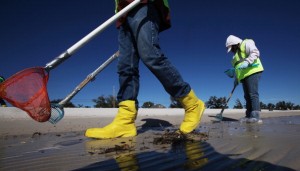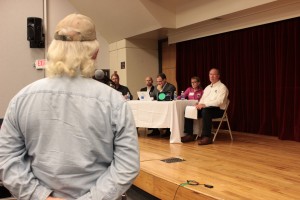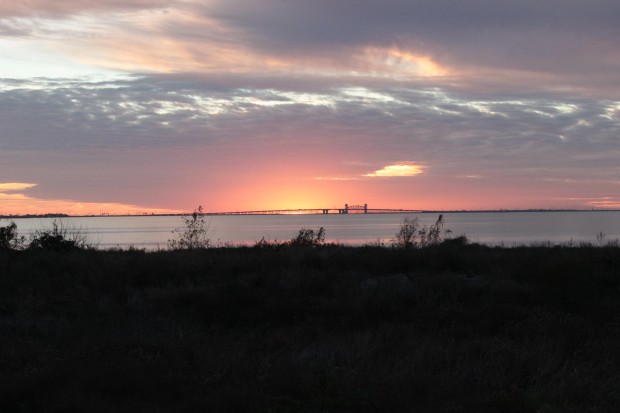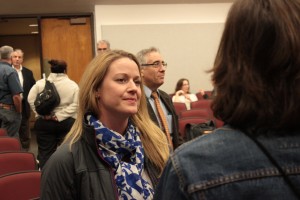Restrooms or Wetlands: How Should Texas Spend BP Spill Money?

Photo by Mario Tama/Getty Images
Workers clean tarballs from the BP oil spill on Waveland beach December 6, 2010 in Waveland, Mississippi.
Bad as the BP Deepwater Horizon spill was with its oil tainting miles of Texas beaches (36 miles to be exact, according to the state), there is now restoration money floating into Texas.
As part of an agreement reached in 2011 for “early oil spill restoration,” BP is paying Texas and four other Gulf Coast states a total of $1 billion. Texas’s portion is $100 million.
But in Texas, there is disagreement over what deserves the most immediate attention, a debate that goes something like this: Restrooms v. Wetlands.
Texas Wants to Upgrade Parks

Dave Fehling / StateImpact
Roy Edwards of Brazoria addresses Texas and federal officials at meeting in Galveston
On one side is the Texas Department of Parks and Wildlife. The money is sorely needed by the department. During the state budget crisis in 2011, it had to beg the public for donations to keep parks open. The BP spill the year before had already damaged the department’s revenues because the threat of oily beaches kept visitors — and their entrance fees — away.
“People actually changed their patterns of recreation as a result of the spill. The effects of that went much, much broader than the footprint of the spill,” said Don Pitts, the department’s director for managing the BP spill money.
Parks and Wildlife has come up with five initial projects, costing about $18.4 million. All are considered “recreational:” building new restrooms, showers and other facilities at storm-battered beach parks on Galveston Island and near Port Arthur. The three other projects involve building artificial reefs miles offshore for fishing and diving.
Less Restrooms, More Restoration
But at public meetings held in Texas coastal communities last week, the Parks and Wildlife proposals drew criticism from environmentalists, who said the recreational projects were shortsighted.
“We would love to see a bigger focus on sustainable ecosystem restoration projects. We think those can provide some long-term payoff to the state of Texas,” said Scott Jones, Director of Advocacy at the Galveston Bay Foundation. He was among a dozen people who each got three minutes to address state and federal officials at a meeting in Galveston.

Dave Fehling / StateImpact
Environmentalist want BP money to go to restore shoreline and wetlands in coastal areas including Galveston Bay
Brandt Mannchen, a long-time environmental activist in the Houston area, told the officials that spending millions on park improvements like showers and restrooms might be a waste of precious funding.
“This money is now public money, and tomorrow during hurricane season it could all be gone again,” Mannchen said. “I’m looking for: Where are the large oyster reef restoration projects? Where are the large wetlands restoration programs? Where are the large coastal prairie restoration proposals? And they’re aren’t any.”
Others who were critical of the Texas approach pointed out that the other states — Florida, Alabama, Mississippi and Lousiana — had all included ecosystem restoration projects in their initial proposals.

Dave Fehling / StateImpact
Amanda Fuller with the National Wildlife Federation
“We don’t really understand why Texas is positioned differently than the other states when it comes to restoration,” said Amanda Fuller, a Texas policy specialist with the National Wildlife Federation.
“I also haven’t come across anything that explains, really, why all five of our projects are 100 percent recreational projects,” Fuller told StateImpact Texas.
Parks Department: Be Patient
The Parks Department’s Don Pitts said restoration projects are not being overlooked. He told StateImpact Texas that the initial proposal is “just our first step,” and that subsequent proposals will include ecosystem projects.
“That’s a process that’s proven a bit more difficult than we anticipated, and we’re just not there yet with our ecological projects. It’s something that we work daily on,” said Pitts.
But critics worry that Texas is falling behind other states in getting the ecosystem projects moving.
“This is the way ecosystems work: everything’s interconnected. You can’t restore a piece over in Florida and ignore the other side (of the Gulf),” said Amanda Fuller with the wildlife group.

